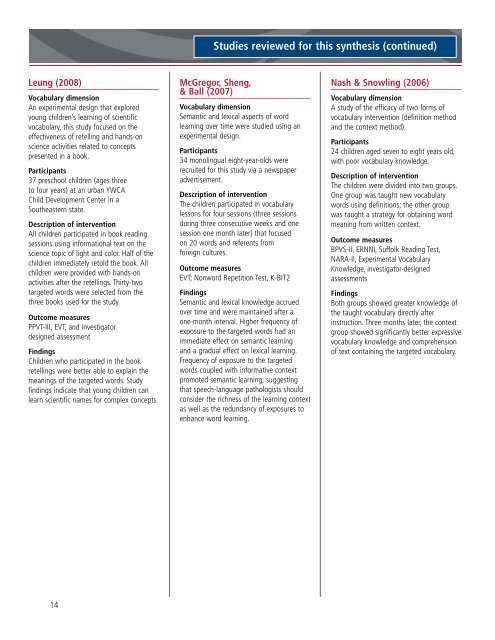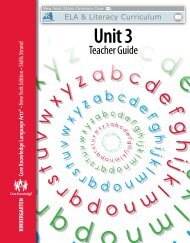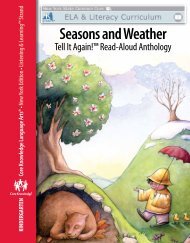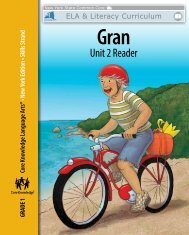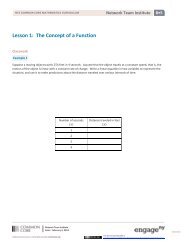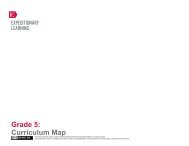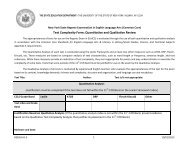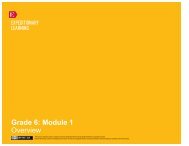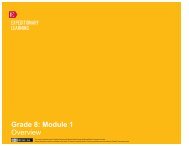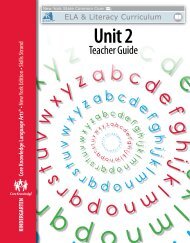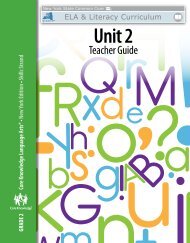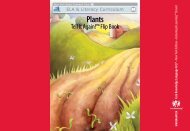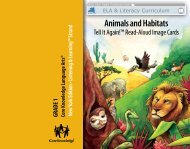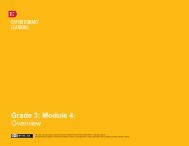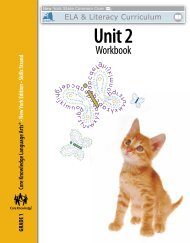A Review of the Current Research on Vocabulary Instruction - U.S. ...
A Review of the Current Research on Vocabulary Instruction - U.S. ...
A Review of the Current Research on Vocabulary Instruction - U.S. ...
You also want an ePaper? Increase the reach of your titles
YUMPU automatically turns print PDFs into web optimized ePapers that Google loves.
Studies reviewed for this syn<str<strong>on</strong>g>the</str<strong>on</strong>g>sis (c<strong>on</strong>tinued) Appendix<br />
Leung (2008)<br />
<strong>Vocabulary</strong> dimensi<strong>on</strong><br />
An experimental design that explored<br />
young children’s learning <str<strong>on</strong>g>of</str<strong>on</strong>g> scientific<br />
vocabulary, this study focused <strong>on</strong> <str<strong>on</strong>g>the</str<strong>on</strong>g><br />
effectiveness <str<strong>on</strong>g>of</str<strong>on</strong>g> retelling and hands-<strong>on</strong><br />
science activities related to c<strong>on</strong>cepts<br />
presented in a book.<br />
Participants<br />
37 preschool children (ages three<br />
to four years) at an urban YWCA<br />
Child Development Center in a<br />
Sou<str<strong>on</strong>g>the</str<strong>on</strong>g>astern state.<br />
Descripti<strong>on</strong> <str<strong>on</strong>g>of</str<strong>on</strong>g> interventi<strong>on</strong><br />
All children participated in book reading<br />
sessi<strong>on</strong>s using informati<strong>on</strong>al text <strong>on</strong> <str<strong>on</strong>g>the</str<strong>on</strong>g><br />
science topic <str<strong>on</strong>g>of</str<strong>on</strong>g> light and color. Half <str<strong>on</strong>g>of</str<strong>on</strong>g> <str<strong>on</strong>g>the</str<strong>on</strong>g><br />
children immediately retold <str<strong>on</strong>g>the</str<strong>on</strong>g> book. All<br />
children were provided with hands-<strong>on</strong><br />
activities after <str<strong>on</strong>g>the</str<strong>on</strong>g> retellings. Thirty-two<br />
targeted words were selected from <str<strong>on</strong>g>the</str<strong>on</strong>g><br />
three books used for <str<strong>on</strong>g>the</str<strong>on</strong>g> study.<br />
Outcome measures<br />
PPVT-III, EVT, and investigator<br />
designed assessment<br />
Findings<br />
Children who participated in <str<strong>on</strong>g>the</str<strong>on</strong>g> book<br />
retellings were better able to explain <str<strong>on</strong>g>the</str<strong>on</strong>g><br />
meanings <str<strong>on</strong>g>of</str<strong>on</strong>g> <str<strong>on</strong>g>the</str<strong>on</strong>g> targeted words. Study<br />
findings indicate that young children can<br />
learn scientific names for complex c<strong>on</strong>cepts.<br />
McGregor, Sheng,<br />
& Ball (2007)<br />
<strong>Vocabulary</strong> dimensi<strong>on</strong><br />
Semantic and lexical aspects <str<strong>on</strong>g>of</str<strong>on</strong>g> word<br />
learning over time were studied using an<br />
experimental design.<br />
Participants<br />
34 m<strong>on</strong>olingual eight-year-olds were<br />
recruited for this study via a newspaper<br />
advertisement.<br />
Descripti<strong>on</strong> <str<strong>on</strong>g>of</str<strong>on</strong>g> interventi<strong>on</strong><br />
The children participated in vocabulary<br />
less<strong>on</strong>s for four sessi<strong>on</strong>s (three sessi<strong>on</strong>s<br />
during three c<strong>on</strong>secutive weeks and <strong>on</strong>e<br />
sessi<strong>on</strong> <strong>on</strong>e m<strong>on</strong>th later) that focused<br />
<strong>on</strong> 20 words and referents from<br />
foreign cultures.<br />
Outcome measures<br />
EVT; N<strong>on</strong>word Repetiti<strong>on</strong> Test, K-BIT2<br />
Findings<br />
Semantic and lexical knowledge accrued<br />
over time and were maintained after a<br />
<strong>on</strong>e-m<strong>on</strong>th interval. Higher frequency <str<strong>on</strong>g>of</str<strong>on</strong>g><br />
exposure to <str<strong>on</strong>g>the</str<strong>on</strong>g> targeted words had an<br />
immediate effect <strong>on</strong> semantic learning<br />
and a gradual effect <strong>on</strong> lexical learning.<br />
Frequency <str<strong>on</strong>g>of</str<strong>on</strong>g> exposure to <str<strong>on</strong>g>the</str<strong>on</strong>g> targeted<br />
words coupled with informative c<strong>on</strong>text<br />
promoted semantic learning, suggesting<br />
that speech-language pathologists should<br />
c<strong>on</strong>sider <str<strong>on</strong>g>the</str<strong>on</strong>g> richness <str<strong>on</strong>g>of</str<strong>on</strong>g> <str<strong>on</strong>g>the</str<strong>on</strong>g> learning c<strong>on</strong>text<br />
as well as <str<strong>on</strong>g>the</str<strong>on</strong>g> redundancy <str<strong>on</strong>g>of</str<strong>on</strong>g> exposures to<br />
enhance word learning.<br />
Nash & Snowling (2006)<br />
<strong>Vocabulary</strong> dimensi<strong>on</strong><br />
A study <str<strong>on</strong>g>of</str<strong>on</strong>g> <str<strong>on</strong>g>the</str<strong>on</strong>g> efficacy <str<strong>on</strong>g>of</str<strong>on</strong>g> two forms <str<strong>on</strong>g>of</str<strong>on</strong>g><br />
vocabulary interventi<strong>on</strong> (definiti<strong>on</strong> method<br />
and <str<strong>on</strong>g>the</str<strong>on</strong>g> c<strong>on</strong>text method).<br />
Participants<br />
24 children aged seven to eight years old,<br />
with poor vocabulary knowledge.<br />
Descripti<strong>on</strong> <str<strong>on</strong>g>of</str<strong>on</strong>g> interventi<strong>on</strong><br />
The children were divided into two groups.<br />
One group was taught new vocabulary<br />
words using definiti<strong>on</strong>s; <str<strong>on</strong>g>the</str<strong>on</strong>g> o<str<strong>on</strong>g>the</str<strong>on</strong>g>r group<br />
was taught a strategy for obtaining word<br />
meaning from written c<strong>on</strong>text.<br />
Outcome measures<br />
BPVS-II, ERNNI, Suffolk Reading Test,<br />
NARA-II, Experimental <strong>Vocabulary</strong><br />
Knowledge, investigator-designed<br />
assessments<br />
Findings<br />
Both groups showed greater knowledge <str<strong>on</strong>g>of</str<strong>on</strong>g><br />
<str<strong>on</strong>g>the</str<strong>on</strong>g> taught vocabulary directly after<br />
instructi<strong>on</strong>. Three m<strong>on</strong>ths later, <str<strong>on</strong>g>the</str<strong>on</strong>g> c<strong>on</strong>text<br />
group showed significantly better expressive<br />
vocabulary knowledge and comprehensi<strong>on</strong><br />
<str<strong>on</strong>g>of</str<strong>on</strong>g> text c<strong>on</strong>taining <str<strong>on</strong>g>the</str<strong>on</strong>g> targeted vocabulary.<br />
14


